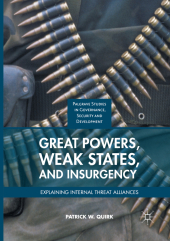 Neuerscheinungen 2018Stand: 2020-02-01 |
Schnellsuche
ISBN/Stichwort/Autor
|
Herderstraße 10
10625 Berlin
Tel.: 030 315 714 16
Fax 030 315 714 14
info@buchspektrum.de |

Patrick W. Quirk
Great Powers, Weak States, and Insurgency
Explaining Internal Threat Alliances
Softcover reprint of the original 1st ed. 2017. 2018. xi, 278 S. 210 mm
Verlag/Jahr: SPRINGER, BERLIN; SPRINGER INTERNATIONAL PUBLISHING 2018
ISBN: 3-319-83732-X (331983732X)
Neue ISBN: 978-3-319-83732-1 (9783319837321)
Preis und Lieferzeit: Bitte klicken
This book offers an original and theoretically rich examination into the dynamics of alliances that great powers and weak states form to defeat threats, such as rebellion or insurgency, within the smaller state´s borders. The author examines contemporary examples of such "internal threat alliances," including Russia´s collaboration with Syria´s Assad regime to defeat anti-government rebels and U.S. cooperation with Afghanistan´s ruling political elite to combat the Taliban. In each case, the weaker state´s leadership wanted to remain in power while the great power sought to safeguard its interests linked to the regime´s stability. The book adds to International Relations (IR) theory by presenting a distinct conceptual framework that explains why internal threat alliances form, why some are more cohesive than others, and why some are effective while others are not. It thus promises to be of interest to IR scholars and students working in the areas of security studies, alliance dynamics, political violence, and civil war, but also to policy-makers grappling with how to salvage interests, such as access to natural resources or regional stability, imperiled by violence in weak states.
1. Internal Threat Alliances: A New Conceptual Framework
2. US-Colombia Internal Threat Alliance (1980-2010)
3. US-Afghanistan Internal Threat Alliance (2001-2012)
4. Russia-Syria Internal Threat Alliance (2010-2016)
5. Conclusions
Patrick W. Quirk is a Senior Policy Advisor with the Bureau of Conflict and Stabilization Operations at the US Department of State and an Adjunct Professor in the Department of Government at Georgetown University, USA.


